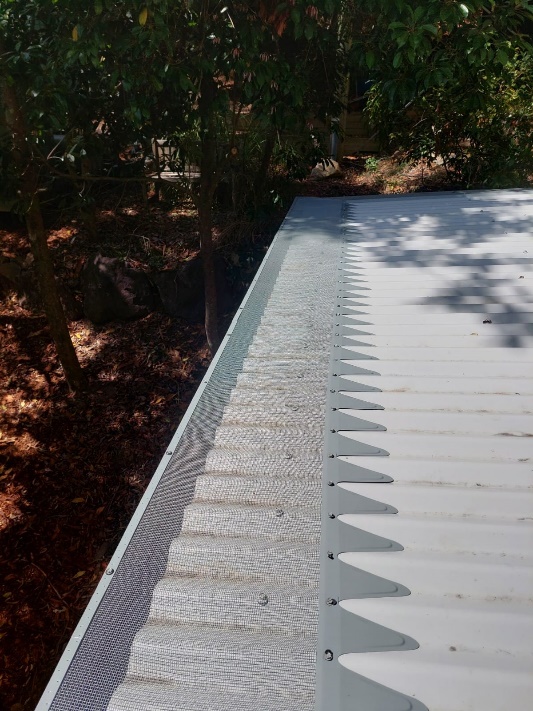Step into the serene world of homeowners who seek solace in their personal oasis, away from the chaotic whirlwind of work and daily life. Picture yourself sipping your morning coffee, surrounded by lush greenery that effortlessly transports you into the soothing embrace of nature. However, as time passes, this tranquil haven begins to lose its charm, morphing into a neglected rooftop and gutter cluttered with unwelcome foliage. Without chopping down your paradise surroundings, is there a solution? That’s where Gutter Guard comes to the rescue! Although, installation can be a costly exercise, but with the right advice you can get the best guard for the best price.
What Are The Options?
Gutter guards come in two primary categories: those that sit on top of the gutter and those that are inserted into the gutter. The most common and usually more expensive option for over-the-top installation is the Mesh Gutter Guard, available in aluminium or steel. The hole aperture of this guard varies based on the type of debris it aims to prevent, and it is installed by screwing it into the gutter and roof material.
On the other hand, the second category, insert-type gutter guards, offers a wide range of options. Whilst performing Sunshine Coast gutter cleaning services we have noticed that it is very important to be cautious of poor-quality insert gutter guards often mass distributed at mainstream home and hardware stores. We find these cheap insert gutter guards as the culprits of many blockages in the gutters as they breakdown.
Which Gutter Guard Is Right For Me?
Choosing the right gutter guard depends on several factors specific to your home. Consider the predominant type of debris and foliage, the possibility of large branches falling onto the roof, the pitch and material of the roof, as well as the size and style of the gutter.
 Debris Type
Debris Type
When it comes to debris type, it can vary greatly in size, from long pine needles and bamboo branches to palm fronds and small leaf shedding. Larger debris requires a larger hole aperture to allow better water flow into the gutters. For small debris like pine needles, a mesh over-the-top gutter guard with a small hole aperture is recommended. When it comes to insert-type gutter guards, choose one that matches the type of debris you commonly encounter.
Large Branches
Trees such as gum trees produce large branches that can fall with force. This poses a problem for mesh-type gutter guards as the branches can penetrate and break the mesh, particularly aluminium mesh, which is weaker than steel mesh.
Debris decomposes under gutter guard
Pitch & Material of Roof
The pitch and material of your roof also play a significant role in the effectiveness of your gutter guard. Steep roof pitches allow debris to blow off the gutters easily, but they can also cause rainwater to rush down the roof and potentially miss the gutters. For flat roofs, use a gutter mesh with smaller holes to prevent debris from clogging the gutters. On the other hand, steeper roofs benefit from gutter guards with larger holes, such as mesh guards or foam guards, to facilitate water flow and prevent water sheeting off the roof.
Size/Style of Guttering
Consider the size and style of your gutters. Deep gutters may not work well with foam-style gutter guards due to their imperfect fit, allowing debris to accumulate on top. Shallow gutters, on the other hand, may not be compatible with mesh gutter guards featuring small holes, as they can impede water flow and cause rainwater to sheet off during heavy downpours. Assess the specific style of your gutters before making a decision.
 How Do I Save Money?
How Do I Save Money?
Saving money is an important consideration when it comes to gutter guards. Evaluate the overall cost of gutter cleaning, gutter guard installation, and the lifespan of your gutters. In some cases, a high-quality foam insert gutter guard resistant to UV damage, accompanied by a reliable warranty, may be a cost-effective option. If your property experiences regular debris build-up without large branches falling, a more affordable choice would be an aluminum mesh gutter guard. However, it’s crucial to note that regular maintenance is still necessary, as neglecting cleaning can lead to debris accumulation, roof damage, and rust.
In some situations, opting for a 12-month gutter cleaning service may be the most cost-effective choice in the long run. Consider your specific circumstances and weigh the benefits of gutter guard installation against the need for periodic cleaning. Gutter guard gutters still require maintenance to ensure their effectiveness and prevent potential damage.
Steel Mesh Gutter Guard Installation
Selecting the right gutter guard is crucial for a well-maintained and debris-free home. Homeowners must consider factors such as the type of debris, the possibility of large branches falling, the roof pitch and material, as well as the size and style of the gutter. Mesh gutter guards offer an effective solution for over-the-top installation, while insert-type gutter guards require careful consideration to avoid poor-quality options. Assess your specific needs and determine if the investment in gutter guard installation is justified. Remember, regular maintenance and cleaning are still necessary even with gutter guards in place. By making informed choices and understanding the influencing factors, homeowners can find the best gutter guard that suits their needs, maintaining the charm of their home while keeping their gutters clean and functional.
By Simone Keck
BIO
I’m Simone, a passionate woman in the trade industry. Alongside my husband, I co-manage Just Gutters, a successful Sunshine Coast gutter cleaning company. I enjoy sharing our knowledge and writing about my love for DIY.

 Debris Type
Debris Type How Do I Save Money?
How Do I Save Money?